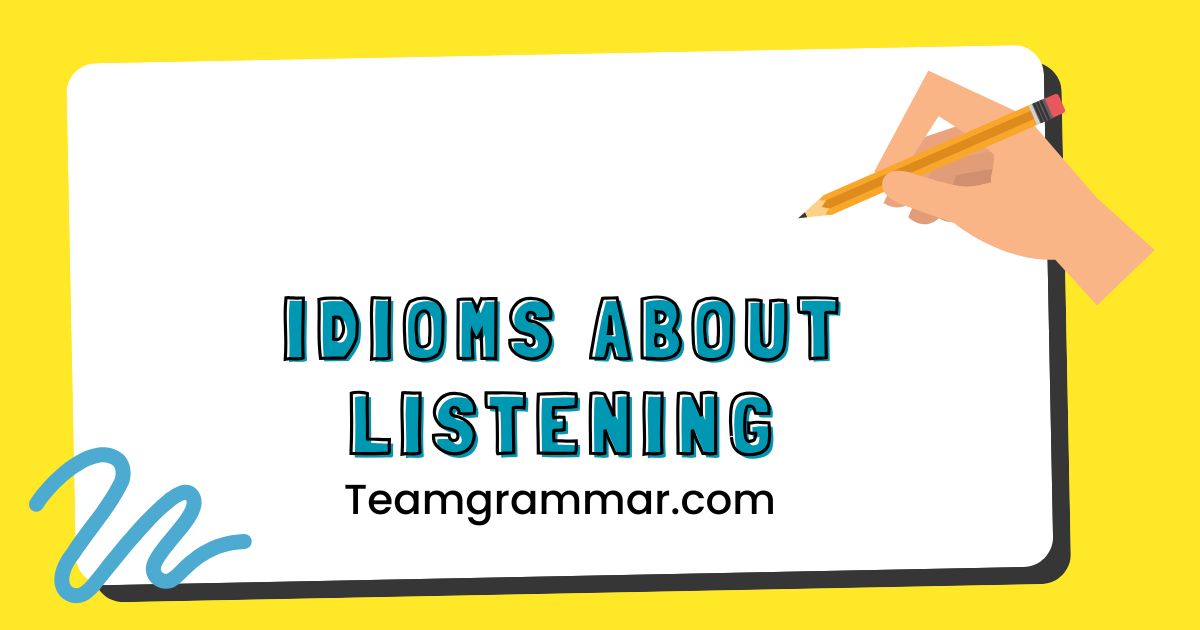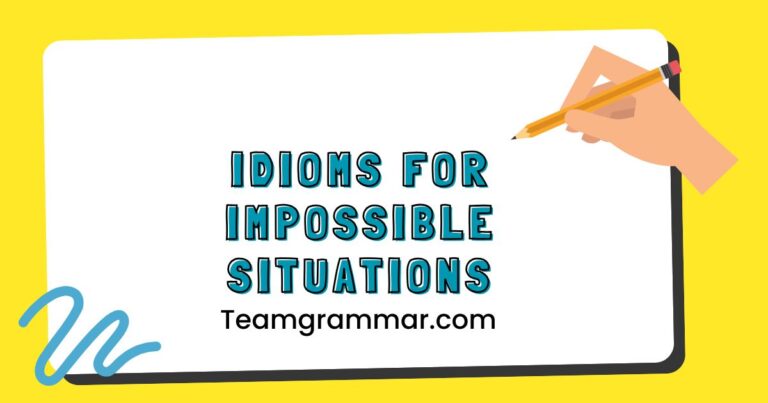47 Idioms About Listening: Mastering English Figurative Language
Understanding idioms is crucial for mastering English, as they add color and nuance to everyday conversations. Idioms related to listening are particularly important because they reflect how we perceive and process information.
This article explores a wide range of idioms about listening, providing definitions, examples, and usage rules. Whether you’re an ESL student, a language enthusiast, or simply looking to enhance your communication skills, this guide will help you grasp the subtle meanings behind these common expressions and use them effectively in your own speech and writing.
Table of Contents
- Introduction
- Definition of Listening Idioms
- Structural Breakdown
- Types and Categories of Listening Idioms
- Idioms About Attentive Listening
- Idioms About Inattentive Listening
- Idioms About Overhearing
- Idioms About Believing or Disbelieving
- Idioms About Seeking or Ignoring Advice
- Examples of Listening Idioms
- Usage Rules
- Common Mistakes
- Practice Exercises
- Advanced Topics
- FAQ
- Conclusion
Definition of Listening Idioms
Idioms are phrases or expressions whose meanings cannot be understood from the ordinary meanings of the individual words. Instead, they carry a figurative or symbolic meaning that has evolved through cultural usage.
Listening idioms specifically relate to the act of hearing, paying attention, or reacting to auditory information. These idioms often describe not just the physical act of listening but also the emotional and cognitive processes involved.
Classification: Listening idioms can be classified as phrasal verbs, metaphorical expressions, or proverbs, depending on their structure and origin. For instance, “lend an ear” is a metaphorical expression, while “tune out” is a phrasal verb.
Function:The primary function of listening idioms is to add depth and color to communication. They allow speakers to convey complex ideas or emotions concisely and memorably.
They also serve to establish rapport and understanding between speakers who share a cultural context.
Contexts:Listening idioms are used in a wide range of contexts, from casual conversations to formal speeches. They are particularly common in informal settings, where their figurative language can create a sense of intimacy and shared understanding.
However, they can also be used effectively in more formal contexts, provided that the audience is familiar with their meanings.
Structural Breakdown
Listening idioms can vary significantly in their structure, but they often involve common verbs related to hearing, such as “hear,” “listen,” “catch,” or “pick up.” They may also include prepositions that modify the meaning of the verb, such as “to,” “in,” “out,” or “on.”
Verb + Preposition:Many listening idioms are phrasal verbs, consisting of a verb and a preposition. These idioms often have a meaning that is different from the sum of their parts.
For example, “tune out” means to stop paying attention, not simply to adjust a musical instrument.
Metaphorical Expressions: Some listening idioms are metaphorical expressions that use figurative language to convey a particular meaning. For example, “lend an ear” uses the metaphor of lending something tangible (an ear) to represent the act of listening attentively.
Proverbs: A few listening idioms are proverbs or sayings that express a general truth or piece of advice. For example, “hear no evil, see no evil, speak no evil” is a proverb that advises people to avoid involvement in wrongdoing.
Types and Categories of Listening Idioms
Listening idioms can be categorized based on the specific aspect of listening they describe. Here are some common categories:
Idioms About Attentive Listening
These idioms describe the act of paying close attention to what someone is saying.
Idioms About Inattentive Listening
These idioms describe the act of not paying attention or ignoring what someone is saying.
Idioms About Overhearing
These idioms describe the act of accidentally hearing something that was not intended for you.
Idioms About Believing or Disbelieving
These idioms describe the act of accepting or rejecting what someone is saying as true.
Idioms About Seeking or Ignoring Advice
These idioms describe the act of asking for or disregarding guidance from others.
Examples of Listening Idioms
The following tables provide examples of listening idioms, categorized by their meaning. Each idiom is defined and illustrated with example sentences.
Table 1: Attentive Listening Idioms
The following table lists idioms related to attentive listening. These idioms describe situations where someone is actively and carefully listening.
| Idiom | Definition | Example Sentence |
|---|---|---|
| Lend an ear | To listen attentively and sympathetically. | “I’m here to lend an ear if you need to talk about your problems.” |
| Hang on someone’s words | To listen very carefully and attentively to someone. | “The children hung on their grandfather’s words as he told them a story.” |
| All ears | To be eager and ready to listen. | “Tell me what happened – I’m all ears.” |
| Prick up one’s ears | To listen carefully because you have heard something interesting or surprising. | “She pricked up her ears when she heard her name mentioned in the conversation.” |
| Listen up | To pay attention and listen carefully. | “Listen up, everyone! I have an important announcement to make.” |
| Give someone your ear | To listen to someone attentively. | “Can you give me your ear for a moment? I need to discuss something important.” |
| Be all ears | To be very interested in hearing what someone has to say. | “Okay, I’m all ears. Tell me everything that happened at the meeting.” |
| Hear someone out | To listen to someone until they have finished speaking, without interrupting. | “Please hear me out before you make a decision.” |
| Take heed | Pay attention to and consider (advice or a warning). | “They should take heed of the health warnings.” |
| Give a listening ear | To listen with sympathy and understanding. | “She always gives a listening ear to her friends when they’re in trouble.” |
| Be an attentive listener | To pay close attention to what someone is saying. | “A good therapist is an attentive listener.” |
| Hear every word | To listen so carefully that you don’t miss anything. | “I heard every word he said, even though he was whispering.” |
| Listen with both ears | To listen very carefully and intently. | “When the teacher is explaining something important, you should listen with both ears.” |
| Be glued to someone’s lips | To watch or listen to someone with complete attention. | “The audience was glued to the speaker’s lips during the captivating lecture.” |
| Take something to heart | To pay attention to and be influenced by (advice or criticism). | “He took his father’s advice to heart and worked hard to improve his grades.” |
| Attend to | To deal with or pay attention to something. | “The doctor attended to the patient’s concerns with great care.” |
| Concentrate on | To focus all one’s attention on a particular thing. | “I need to concentrate on what she’s saying to understand the instructions.” |
| Be engrossed in | To absorb all the attention or interest of someone. | “She was so engrossed in the story that she didn’t hear me come in.” |
| Listen intently | To listen with great concentration and focus. | “The students listened intently as the professor explained the complex theory.” |
| Give full attention | To dedicate all your focus and concentration to listening. | “Please give me your full attention while I explain this important matter.” |
| Focus one’s attention | To direct one’s concentration on a particular sound or speaker. | “She focused her attention on the speaker to catch every detail.” |
| Listen with rapt attention | To listen with complete fascination and absorption. | “The children listened with rapt attention to the storyteller’s enchanting tales.” |
| Mindful listening | Actively paying attention to what someone is saying without judgment. | “Mindful listening can improve relationships and understanding.” |
Table 2: Inattentive Listening Idioms
The following table lists idioms related to inattentive listening. These idioms describe situations where someone is not paying attention or is ignoring what is being said.
| Idiom | Definition | Example Sentence |
|---|---|---|
| Tune out | To stop paying attention to something. | “I tend to tune out when people start talking about politics.” |
| Go in one ear and out the other | To be heard by someone but immediately forgotten. | “I’ve told him to clean his room a hundred times, but it just goes in one ear and out the other.” |
| Fall on deaf ears | To be ignored or disregarded. | “My complaints about the noise fell on deaf ears.” |
| Turn a deaf ear | To ignore someone’s request or plea. | “The government turned a deaf ear to the protesters’ demands.” |
| Be out to lunch | To be unaware of what is going on; to be mentally checked out. | “He seems to be out to lunch today; he hasn’t said a word in the meeting.” |
| Glaze over | To have one’s eyes lose focus, indicating boredom or inattention. | “Her eyes glazed over as the speaker droned on about the company’s finances.” |
| Not hear a word | To not pay attention to what someone is saying. | “I was so tired that I didn’t hear a word he said.” |
| Pay no attention to | To disregard or ignore something. | “Pay no attention to what he says; he’s always complaining.” |
| Turn a blind eye | To ignore something that one knows is wrong. | “The manager turned a blind eye to the employee’s misconduct.” |
| Be oblivious to | To be unaware or unconscious of something. | “He was completely oblivious to the fact that everyone was staring at him.” |
| Dismiss out of hand | To reject something without considering it. | “The committee dismissed his proposal out of hand.” |
| Brush aside | To ignore or dismiss something as unimportant. | “She brushed aside his concerns about the project.” |
| Disregard completely | To pay no attention to something at all. | “They completely disregarded the safety regulations.” |
| Be insensitive to | To not be aware of or understand someone’s feelings or needs. | “He was insensitive to her feelings when he made that joke.” |
| Be immune to | To not be affected by something. | “He’s immune to criticism; he never takes it to heart.” |
| Not give a damn | To not care at all about something. | “He doesn’t give a damn about what anyone thinks of him.” |
| Be indifferent to | To have no particular interest or sympathy. | “She was indifferent to the suffering of others.” |
| Be nonchalant about | To appear calm and relaxed, not displaying interest or concern. | “He was nonchalant about the upcoming exam, even though he hadn’t studied.” |
| Be detached from | To not be emotionally involved or interested. | “He seemed detached from the conversation, as if he was in another world.” |
| Be preoccupied with | To be absorbed in one’s thoughts and therefore inattentive to others. | “She was too preoccupied with her own problems to listen to her friend’s troubles.” |
| Not register | To fail to be noticed or understood. | “The warning signs didn’t register with him until it was too late.” |
| Be impervious to | To not be affected or disturbed by something. | “He was impervious to the insults hurled at him.” |
Table 3: Overhearing Idioms
The following table lists idioms related to overhearing. These idioms describe situations where someone accidentally hears something not intended for them.
| Idiom | Definition | Example Sentence |
|---|---|---|
| Catch wind of | To hear a rumor or piece of information that is supposed to be secret. | “I caught wind of a possible merger between the two companies.” |
| Hear it through the grapevine | To hear something through informal communication, often gossip. | “I heard it through the grapevine that he’s leaving the company.” |
| Eavesdrop | To secretly listen to a conversation. | “It’s rude to eavesdrop on other people’s conversations.” |
| Pick up | To overhear or learn something informally. | “I picked up some interesting gossip at the party last night.” |
| Hear something on the side | To overhear something unintentionally. | “I heard something on the side about layoffs at the company.” |
| Overhear by chance | To accidentally hear something not meant for you. | “I overheard by chance that they’re planning a surprise party for her.” |
| Listen in | To listen to a conversation without the speakers knowing. | “He was accused of listening in on private phone calls.” |
| Be privy to | To be allowed to know about something private or secret. | “Only a few people were privy to the details of the negotiation.” |
| Get an earful | To overhear an angry or critical lecture. | “I got an earful from my boss for being late.” |
| Catch a snippet of | To hear a small part of a conversation. | “I caught a snippet of their conversation about the new project.” |
| Hear out of context | To hear something without understanding the full situation. | “It’s easy to misunderstand if you hear something out of context.” |
| Accidentally overhear | To unintentionally hear a conversation. | “I accidentally overheard them discussing my performance.” |
Table 4: Believing or Disbelieving Idioms
The following table lists idioms related to believing or disbelieving. These idioms describe situations where someone either accepts or rejects what they hear as true.
| Idiom | Definition | Example Sentence |
|---|---|---|
| Take something with a grain of salt | To not completely believe something that you are told. | “You should take everything he says with a grain of salt; he tends to exaggerate.” |
| Believe one’s ears | To be very surprised to hear something. | “I couldn’t believe my ears when I heard that she had won the lottery.” |
| Hear it from the horse’s mouth | To hear something directly from the person involved. | “I heard it from the horse’s mouth that he’s getting a promotion.” |
| Swallow something hook, line, and sinker | To believe a story completely without questioning it. | “He swallowed the scam hook, line, and sinker.” |
| Buy into | To believe or invest in an idea or concept. | “I don’t buy into his explanation for why he was late.” |
| Give credence to | To believe or accept that something is true. | “The evidence gives credence to his claims.” |
| Put stock in | To believe or have confidence in something. | “I don’t put much stock in rumors.” |
| Accept at face value | To believe something without questioning it. | “I accepted his apology at face value.” |
| Take someone’s word for it | To believe what someone says without needing proof. | “I’ll take your word for it that the information is accurate.” |
| Hear tell of | To hear about something from someone else. | “I’ve heard tell of some strange happenings in that old house.” |
| Turn a deaf ear to | To refuse to listen to or believe something. | “He turned a deaf ear to the warnings about the dangers of smoking.” |
Table 5: Seeking or Ignoring Advice Idioms
The following table lists idioms related to seeking or ignoring advice. These idioms describe situations where someone seeks guidance or disregards suggestions from others.
| Idiom | Definition | Example Sentence |
|---|---|---|
| Take advice | To follow guidance from someone else. | “It’s always wise to take advice from experienced professionals.” |
| Heed advice | To pay attention to and follow advice. | “He heeded the advice of his elders and made a wise decision.” |
| Follow someone’s lead | To do what someone else does or suggests. | “If you’re not sure what to do, just follow my lead.” |
| Listen to reason | To be willing to consider sensible arguments. | “I wish he would listen to reason and stop wasting his money.” |
| Disregard advice | To ignore or reject guidance. | “He disregarded all the advice and made a terrible mistake.” |
| Turn a deaf ear to advice | To refuse to listen to guidance. | “She turned a deaf ear to her parents’ advice about her career.” |
| Go against someone’s advice | To act contrary to what someone suggests. | “He went against his lawyer’s advice and pleaded guilty.” |
| Turn a deaf ear | To ignore someone’s advice or warnings. | “She turned a deaf ear to his warnings and continued her risky behavior.” |
| Be deaf to | To be unwilling to listen to or consider something. | “He was deaf to all appeals for help.” |
Usage Rules
Using listening idioms correctly involves understanding their figurative meanings and applying them in appropriate contexts. Here are some key rules to keep in mind:
- Understand the Meaning: Make sure you fully understand the meaning of the idiom before using it. Using an idiom incorrectly can lead to confusion or miscommunication.
- Consider the Context: Choose idioms that are appropriate for the context of the conversation. Some idioms are more formal than others, and some may be specific to certain regions or cultures.
- Be Mindful of Your Audience: Consider your audience’s familiarity with idioms. If you are speaking to non-native speakers or people from different cultural backgrounds, it may be best to avoid using idioms altogether or to explain them clearly.
- Use Sparingly: While idioms can add color and flavor to your language, using too many idioms can make your speech sound unnatural or contrived.
- Pay Attention to Grammar: Ensure that the idiom fits grammatically into the sentence. Some idioms have specific grammatical requirements, such as verb tense or word order.
Common Mistakes
Here are some common mistakes that learners make when using listening idioms:
Misunderstanding the Meaning: Using an idiom incorrectly because you don’t fully understand its figurative meaning.
Incorrect Grammar: Using the wrong verb tense, preposition, or word order in an idiom.
Inappropriate Context: Using an idiom in a context where it is not appropriate, such as a formal speech or a conversation with someone who is not familiar with the idiom.
Overusing Idioms: Using too many idioms in a short space of time, making your speech sound unnatural.
Literal Interpretation: Interpreting an idiom literally instead of figuratively.
Examples of Common Mistakes:
| Incorrect | Correct | Explanation |
|---|---|---|
| “I’m listening you.” | “I’m all ears.” | “Listening you” is a literal translation and doesn’t convey the idiomatic meaning of being ready to listen. |
| “The news fell on deaf ears.” | “My complaints fell on deaf ears.” | The idiom typically refers to complaints or requests being ignored, not general news. |
| “He lent me his eye.” | “He lent me his ear.” | The correct idiom is “lend an ear,” not “lend an eye.” |
Practice Exercises
Test your understanding of listening idioms with these practice exercises.
Exercise 1: Fill in the Blanks
Choose the correct idiom from the list to complete each sentence.
- I tried to warn him, but my advice __________. (fell on deaf ears, lent an ear)
- Tell me everything – I’m __________. (all ears, one ear)
- She __________ when she heard her name mentioned. (pricked up her ears, turned a deaf ear)
- He __________ that they were planning a surprise party. (caught wind of, lent an ear)
- You should __________ what he says; he tends to exaggerate. (take with a grain of salt, listen intently)
- Despite my warnings, he __________ and made a terrible mistake. (disregarded advice, gave an ear)
- I couldn’t __________ when I heard she had won the lottery. (believe my ears, lend an ear)
- The children __________ as their grandfather told them a story. (hung on his words, tuned out)
- I tend to __________ when people start talking about politics. (tune out, lend an ear)
- He __________ to the protesters’ demands. (turned a deaf ear, lent an ear)
Answer Key:
- fell on deaf ears
- all ears
- pricked up her ears
- caught wind of
- take with a grain of salt
- disregarded advice
- believe my ears
- hung on his words
- tune out
- turned a deaf ear
Exercise 2: Matching
Match each idiom with its definition.
| Idiom | Definition |
|---|---|
| 1. Lend an ear | a. To stop paying attention |
| 2. Tune out | b. To hear something directly from the source |
| 3. Hear it from the horse’s mouth | c. To listen attentively and sympathetically |
| 4. Go in one ear and out the other | d. To be heard but immediately forgotten |
| 5. Fall on deaf ears | e. To be ignored or disregarded |
Answer Key:
- 1-c
- 2-a
- 3-b
- 4-d
- 5-e
Exercise 3: Sentence Completion
Use the given idioms in a sentence.
- All ears: ____________________________________________________
- Prick up one’s ears: _________________________________________
- Take something with a grain of salt: ___________________________
- Hear it through the grapevine: _________________________________
- Turn a deaf ear: ____________________________________________
- Hang on someone’s words: ____________________________________
- Tune out: ___________________________________________________
- Go in one ear and out the other: _____________________________
- Fall on deaf ears: ___________________________________________
- Believe one’s ears: __________________________________________
Example Answers:
- All ears: I’m all ears, tell me about your trip!
- Prick up one’s ears: She pricked up her ears when she heard the dog barking.
- Take something with a grain of salt: You should take his stories with a grain of salt.
- Hear it through the grapevine: I heard it through the grapevine that he is getting married.
- Turn a deaf ear: The company turned a deaf ear to the workers’ complaints.
- Hang on someone’s words: The students hung on the professor’s words during the lecture.
- Tune out: I tend to tune out when people talk about sports.
- Go in one ear and out the other: What I say to him just goes in one ear and out the other.
- Fall on deaf ears: My suggestions always fall on deaf ears.
- Believe one’s ears: I couldn’t believe my ears when I heard the news.
Advanced Topics
For advanced learners, exploring the etymology and cultural context of listening idioms can provide a deeper understanding of their meanings and usage. Consider researching the origins of idioms like “lend an ear” or “hear it through the grapevine” to uncover their historical roots and cultural significance.
Another advanced topic is the use of listening idioms in literature and rhetoric. Authors and speakers often use idioms to add emphasis, create imagery, or connect with their audience.
Analyzing how idioms are used in different genres and contexts can enhance your appreciation of the nuances of English language.
Finally, explore the variations of listening idioms in different dialects of English. While many idioms are widely understood, some may be specific to certain regions or communities.
Learning about these variations can help you communicate more effectively with people from diverse backgrounds.
FAQ
- What is the difference between an idiom and a literal expression?
An idiom is a phrase whose meaning is different from the literal meaning of its individual words. A literal expression, on the other hand, means exactly what it says.
- Why is it important to learn idioms?
Learning idioms is important because they are commonly used in everyday conversations and written texts. Understanding idioms will help you comprehend and communicate more effectively.
- How can I learn new idioms?
You can learn new idioms by reading books, watching movies, listening to podcasts, and paying attention to how native speakers use the language. You can also use online resources and idiom dictionaries.
- Is it okay to use idioms in formal writing?
It depends on the context and audience. In general, it’s best to avoid using idioms in formal writing unless you’re sure that your audience will understand them and that they are appropriate for the tone of your writing.
- What should I do if I don’t understand an idiom?
If you don’t understand an idiom, ask someone to explain it to you, or look it up in an idiom dictionary. Don’t be afraid to ask for clarification – it’s better to admit that you don’t understand something than to pretend that you do.
- Are idioms the same in all English-speaking countries?
No, idioms can vary between different English-speaking countries and regions. Some idioms may be specific to certain dialects or cultures.
- How can I practice using idioms?
You can practice using idioms by incorporating them into your own speech and writing. Try to use a few new idioms each day, and pay attention to how native speakers use them in conversation.
- Can idioms have multiple meanings?
Yes, some idioms can have multiple meanings depending on the context in which they are used. It’s important to pay attention to the surrounding words and phrases to understand the intended meaning of the idiom.
- How do I avoid misusing idioms?
To avoid misusing idioms, make sure you fully understand their meaning and usage rules. Practice using them in different contexts, and ask for feedback from native speakers.
- Are there any resources available to help me learn idioms?
Yes, there are many resources available to help you learn idioms, including online dictionaries, idiom books, language learning apps, and websites.
- Is it better to use idioms sparingly or frequently?
It’s generally better to use idioms sparingly. While they can add color and flavor to your language, overusing them can make your speech sound unnatural or contrived. Use idioms when they enhance your communication, but avoid forcing them into every sentence.
- How can I tell if an expression is an idiom or just a common phrase?
An idiom’s meaning is not deducible from the literal definitions of its constituent words. If you can’t understand the meaning of a phrase by simply knowing the definitions of the words it contains, it’s likely an idiom.
Conclusion
Mastering idioms about listening is an essential step in achieving fluency in English. These idioms add depth, color, and nuance to your communication, allowing you to express yourself more effectively and connect with native speakers on a deeper level.
By understanding the definitions, usage rules, and common mistakes associated with listening idioms, you can confidently incorporate them into your speech and writing.
Remember to practice regularly, pay attention to context, and be mindful of your audience. With dedication and effort, you can unlock the power of listening idioms and enhance your overall command of the English language.
Continue to explore new idioms and refine your understanding, and you’ll be well on your way to becoming a proficient and articulate communicator.







